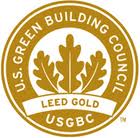
| Feb. 2012 | |||||||||||
| Top stories | |||||||||||
| In the news | |||||||||||
| Photos | |||||||||||
| Contact us | |||||||||||
| Archive | |||||||||||
|
Hygienic Laboratory is LEED certified gold for green building |
The State Hygienic Laboratory at the University of Iowa announced on Feb. 29 that it has been awarded LEED gold certification by the U.S. Green Building Council. A ceremony to highlight the certification will held at the Coralville facility on Tuesday, April 3, with tours beginning at 3:15 p.m. and remarks at 4 p.m.
 |
LEED (Leadership in Energy and Environmental Design) is the nationally recognized benchmark for the design, construction and operation of eco-friendly buildings. It provides independent verification that the new laboratory is built in an environmentally responsible manner, and will be a healthy place to work.
"As the state's environmental testing laboratory, it is important that we demonstrate how environmental sustainability can be achieved while delivering state-of-the-art service," said Hygienic Laboratory Director Christopher Atchison. "What might be missed is the fact that constructing a facility to meet LEED standards can also produce a very welcoming place to work."
The Hygienic Laboratory, located on the UI Research Park campus in Coralville, incorporates the rigorous design and safety requirements of a laboratory facility along with LEED elements in five categories: sustainable sites, water efficiency, energy and atmosphere, materials and resources, and indoor environment. The green aspects of the building include:
- More than one-third of the building products were manufactured within 500 miles of the Laboratory and one-third are made from recycled content.
- Ninety percent of the building has access to natural light.
- Grounds are built with "xeriscaping," which uses plants suited to the climate so that no special watering is needed.
Two other University of Iowa buildings - the Beckwith Boat House and the Sports Medicine Clinic - recently received LEED certification at the gold level. LEED building certification is one of the ways the UI is seeking to achieve its 2020 Vision goal of net-negative energy growth on campus.